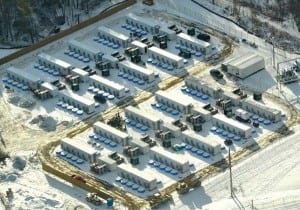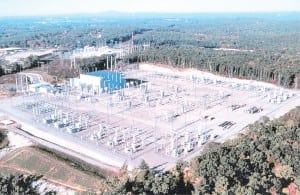Smart Grid
-
Coal
China’s 12th Five-Year Plan Pushes Power Industry in New Directions
The Five-Year Plan is the expression of the centralized planning goals for China’s economy. The 12th Five-Year Plan, approved by the Chinese Government on March 14, 2011, established many social and economic goals, including significant expansion of the country’s power generation industry in many new directions.
-
Smart Grid
New Technology Enhances Grid Stability
For power providers, grid stabilization has been a rising concern in recent years, especially because of the increasing use of intermittent energy sources such as wind turbines. Maintaining a stable electricity grid is difficult because of the unpredictability of intermittent energy sources. If wind turbines, for example, are supplying 5% of the overall power for the grid and the turbines stop moving because the air grows still, the grid has to find a way to kick into overdrive to compensate for this sudden decrease in energy. It’s not as easy as it sounds.
-
Gas
Nordic Nations Provide Clean Energy Leadership
In the past few years, nuclear concerns, rising oil prices, and a growing understanding of our environmental impact has given energy issues a higher profile worldwide. In this report on the Continental Nordic countries, we look at the efforts being made in much of the Nordic region to secure a sustainable energy supply for the future and at the extent to which the innovative solutions of these countries can be exported around the globe.
-
Legal & Regulatory
Utility Managers Ponder Rules, Money, People
What’s on the agenda for the utility industry today and into the future? Platts and Capgemini asked the industry leadership in their latest survey. The answers revolve around regulation, finance, and human resources.
-
Smart Grid
Milestones for Flywheel, Lithium Battery Grid-Scale Projects
Energy storage developments got a boost as Beacon Power Corp. in June announced that its first flywheel energy storage plant in Stephentown, N.Y., achieved its full 20-MW capacity, and AES Energy Storage said its Los Andes battery storage system in Chile had performed continuously for more than 18 months as a critical reserve unit for the nation’s northern grid.
-
Smart Grid
Smart Grid Award: Vermont Electric Cooperative Takes Wise Approach to Smart Grid Projects
A cooperative in northern Vermont serving a largely rural area has proven that even small utilities can achieve great smart grid results by planning wisely. For improving service to its members by developing a grid modernization strategy before “smart grid” was a buzz phrase, Vermont Electric Cooperative is the winner of the first POWER Smart Grid Award.
-
Smart Grid
Accelerating the Pace of EV Deployment
A number of automotive manufacturers, electric utilities, electric power associations, and research groups are working to develop and evaluate technical approaches to integrating plug-in electric vehicles (PEVs) into the U.S. electrical grid system. This is a key requirement of facilitating widespread, near-term adoption of PEVs by the American public.
-
Smart Grid
Modernizing the Grid, Modernizing Our Industry
David K. Owens, executive vice president, Business Operations Group for the Edison Electric Institute, comments on the progress U.S. utilities are making toward a smarter electrical power grid.
-
Solar
The Smart Grid and Distributed Generation: Better Together
Electricity grids are slowly getting smarter. Simultaneously, the use of distributed generation is increasing. Though smart grid advocates tout the ability of a smarter grid to enable greater deployment of distributed resources, the benefits could flow in both directions.
-
Hydro
Transmission and Distribution in Canada
Like its neighbor to the south, Canada faces enormous costs to upgrade and expand its transmission and distribution system. The desire to integrate more renewable power into the grid, build a smarter grid, and export more power are providing the rationale for action, but capital and political will lag behind.







